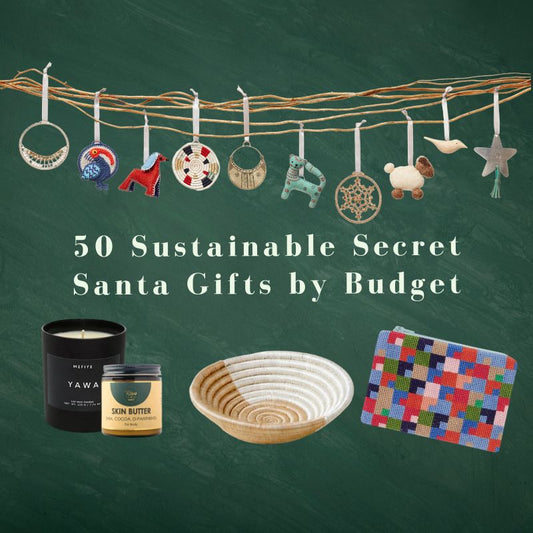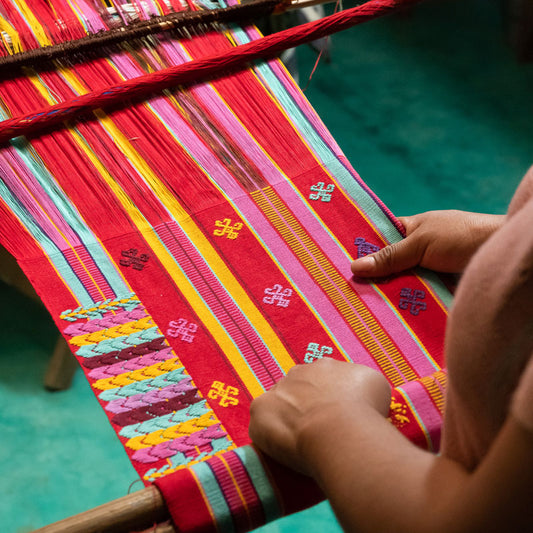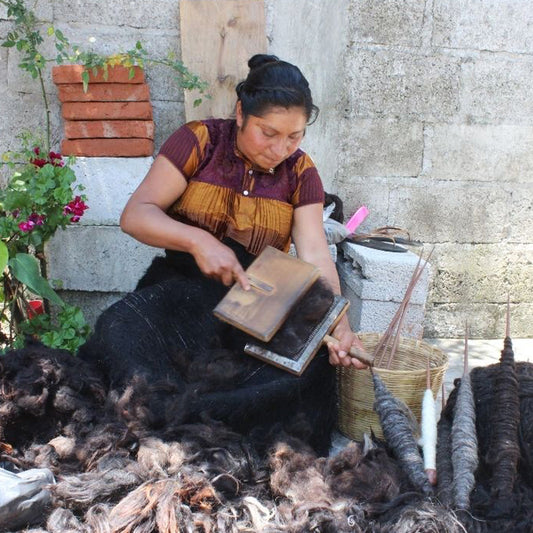Sustainability is a core pillar of AKOJO MARKET. But let’s address the elephant in the room – does consumerism and the making and selling of product contradict true sustainability? Honestly, yes it does, but here is how we are mitigating the risks. Ensuring skilled artisans and creatives have a livelihood and financial stability to cater to their children’s needs in education and a route out of poverty underpins how our brands' work. But so does protection and respect for the local environment. Our brands utilise pioneering manufacturing practices in innovative ways to recognise the value in waste and to support the planet as well as their people.
INTO THE DETAIL...
Sustainability and circularity fuse together science and nature. Upcycling and recycling are a critical way we can reduce our impact on ecosystems and land. Currently, the global fashion industry produces 53 million tonnes of fibre annually. Over 70% of which ends up in landfills or is incinerated and a mere 1% is repurposed to construct new garments. [source from sustainability consultant Sustainable & Social @sustainableandsocial]
With insights from Amy Nguyen, Founder of Sustainable & Social, we unravel how upcycled and recycled materials transform unwanted resources. Our focus on fabric innovation illustrates how we can support brands using the material revolution to drive sustainability.
So, get the chemistry googles on and your foraging clothes ready, as we explain how our brands are fashioning a new future for retail.
BIOACETATE & RECYCLED PLASTICS
Pala Eyewear works with a factory in Italy to produce bio-acetate and acetate that is formed from off-cut materials. Literally breathing life into plastic destined for landfill, and sadly likely to end up in the ocean, Pala’s suppliers have invented a means of heating up, moulding and cooling offcut plastics and bio-based plasticisers made from renewable sources instead of oil-based ones. This makes Pala’s most recently launched frames recyclable and biodegradable too. Pala’s work has not gone unnoticed, recently winning the 2019 Accessory Brand of the Year at the UK’s Sustainable Lifestyle Awards.
UPCYCLED GLASS
To produce QÄSA QÄSA‘s infamous Blantyre Jars, talented artisans in Malawi collect empty wine bottles from local restaurants, cut them to size and hand carve exquisite mahogany wood lids to fit, each with a unique design and wood grain.
Similar processes are employed by our sell-out bracelet brand N2M. Artisans in Ghana formed glass bead bracelets from recycled glass and brought to life the vibrant, bustling culture of Accra street life in their art work.
UPCYCLED METALS
Designed to preserve the delicate and significant eco-system of the Maasai Mara, Kenyan brand Lilabare employs a truly circular approach to manufacturing. Lilabare founder Ria avoids using any heavy-duty and therefore heavy-pollutant machinery. Every button, pendant and bead is created through a process of up-cycling metal sourced from old machinery, locks and other high-quality metal detritus. Of particular wonder is her Lasting Footprints necklace collection: after locating the tracks of some of the most majestic creatures within the Mara eco-system, Lilabare takes casts back to its workshop just outside of Nairobi. Working with highly skilled Kenyan artisans, they begin the process of moulding and scaling the original footprints into pendants. The pendants are handcrafted by melting down old pipes, broken locks & waste machinery. To complete the circle, with each purchase of this necklace, Lilabare plants an indigenous seedling back into the conservancy in which this footprint was found.
Also in the bustling capital of Nairobi, Yala Jewellery is innovating with the use of old brass and metals. Yala’s signature Zero Waste Pendant is the epitome of stylish sustainability. Instead of discarding waste from the process of casting jewellery, Yala shapes and transforms left over brass into smooth, bean-shaped pendants, or “organics”, which are hung delicately from a 14k gold filled chain. Adored by founders Natasha and Annie, and ultimate fashion sustainability activist Arizona Muse.
USE OF INNOVATIVE FABRICS
According to Amy Nguyen, Founder of Sustainable & Social, the future for fabric innovation has never looked more promising. With the use of biotechnology, biofabrication and regenerative agriculture, the power of fruit fibres, algae kelp or even cactus leather to disrupt the use of traditional textiles holds limitless opportunity to drive the sustainability agenda forward. Amy notes that companies across the globe have filed eight times as many fibre innovation patent applications in 2019 versus 2013. Soon, we’ll be wearing our wasted food more than synthetic man-made fibres!
REPREVE LYCRA®
South African brand Gabrielle Swimwear has begun using REPREVE® Lycra to make her swimwear. REPREVE® Lycra is 82% made using recycled plastic bottles cleaned up along the shoreline. REPREVE® produces high-quality and certified recycled fibre in an effort to reduce plastic pollution and care for our environment. Dedicated to making positive change, founder Gabrielle is making all future swimwear with this eco-friendly and sustainable fabric.
TENCEL™
Sustainable clothing brand Asha Eleven uses fabrics made from pure Tencel printed with OEKO-TEX 100 certified process. Tencel™ by Lenzing™ is produced by environmentally responsible processes from the sustainably sourced natural raw material, wood. Recognised as the most sustainable textile on the market, Tencel™ offers a range of features including sustainable production, low environmental impact, long-lasting softness, silky smoothness, enhanced breathability, anti-bacterial, colour retention and biodegradability.
GOTS CERTIFIED COTTON
Many of our brands use GOTS Certified Organic Cotton, including not-for-profit clothing brand Origin Africa. For cotton to be GOTS Certified, it must contain 95% certified organic fibres and meet stringent environmental criteria and trade standards. These include meeting basic requirements on toxicity and biodegradability, the prohibition on toxic heavy metals, solvents, formaldehyde and more, bleaches must be based on oxygen, not chlorine, and operators of GOTS Certified Organic Cotton must maintain full records of water usage and not use PVC in packaging.
Suggested Further Reading – Earth Logic
Discover more magical stories behind our designers, style and design inspiration, whilst delving deeper into the practical aspects of running & growing an ethical business in our Guidance Section.



